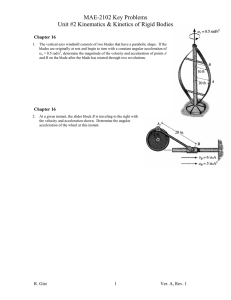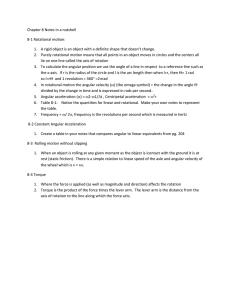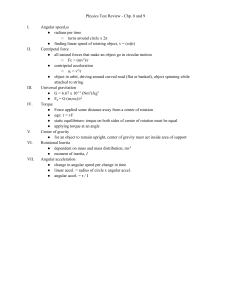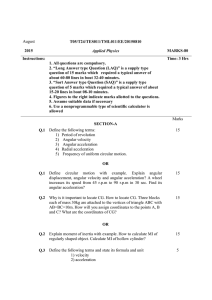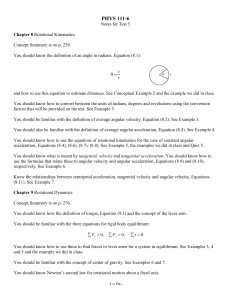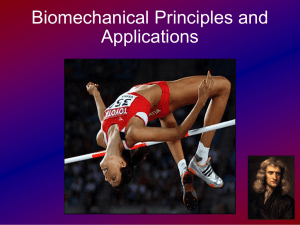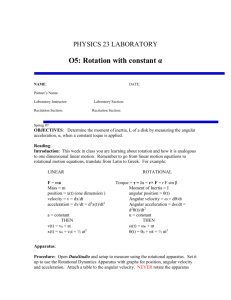Chapter 10 - Rotation • Definitions:
advertisement
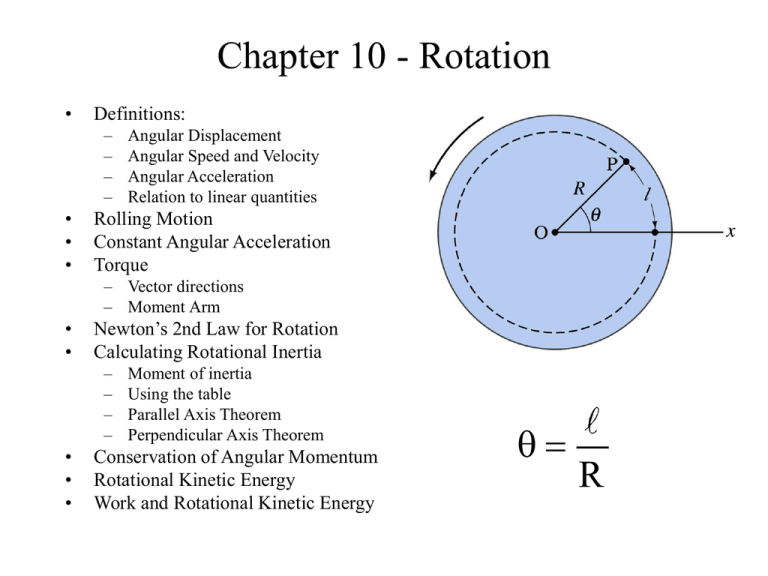
Chapter 10 - Rotation • Definitions: – – – – • • • Angular Displacement Angular Speed and Velocity Angular Acceleration Relation to linear quantities Rolling Motion Constant Angular Acceleration Torque – Vector directions – Moment Arm • • Newton’s 2nd Law for Rotation Calculating Rotational Inertia – – – – • • • Moment of inertia Using the table Parallel Axis Theorem Perpendicular Axis Theorem Conservation of Angular Momentum Rotational Kinetic Energy Work and Rotational Kinetic Energy R Radius vs. position vector Kinematics Memory Aid d2x a 2 dt dx dt dv dt x, x vdt v, v a adt Forces cause acceleration!!! Velocity • Average velocity x x 2 x1 v t t 2 t1 • Instantaneous velocity x dx v lim t 0 t dt L T Angular Displacement 2 1 Angular Velocity • Average angular velocity 2 1 t t 2 t1 • Instantaneous angular velocity d lim t 0 t dt radians 1 T T Acceleration • Average acceleration v v 2 v1 a t t 2 t1 • Instantaneous acceleration v dv a lim t 0 t dt L T 2 dv d dx d 2 x a 2 dt dt dt dt Angular Acceleration • Average angular acceleration 2 1 t t 2 t1 • Instantaneous angular acceleration d lim t 0 t dt radians 1 T 2 T 2 d d d d 2 2 dt dt dt dt Rotational Kinematics Memory Aid , d 2 2 dt d dt d dt , What causes angular acceleration? dt dt Converting angular to linear quantities R velocity d d v R R dt dt tangential acceleration d2 d 2 a 2 R 2 R dt dt Radial acceleration v2 aR r aR R R 2 R2 a a tan a R Frequency vs. angular velocity • Frequency – Cycles per time interval – Revolutions per time interval – Hertz • Angular velocity – Radians per time interval – Sometimes called angular frequency – Radians/sec 2 rad f 1 rev f 2 1 T f Constant Acceleration v v0 at 1 2 x x 0 v 0 t at 2 v v 2a x x 0 2 2 0 v v0 v 2 Constant Angular Acceleration rad / s 2 4.2 rad / s 2 0 t 1 2 0 0 t t 2 2 0 2 2 0 0 2 Problem 1 • A record player is spinning at 33.3 rpm. How far does it turn in 2 seconds. • The motor is shut off. The record player spins down in 20 seconds (assume constant deceleration). – What is the angular acceleration? – How far does it turn during this coast down? Vector nature of angular quantities Rolling without slipping v R Problem 2 • A cylinder of radius 12 cm starts from rest and rotates about its axis with a constant angular acceleration of 5.0 rad/s2. At t = 3.0 sec, what is: – Its angular velocity – The linear speed of the point on the rim – The radial and tangential components of acceleration of a point on the rim. Torque causes angular acceleration • Torque is the moment of the force about an axis • Product of a force and a lever arm • Rotational Analog to Newton’s 2nd Law RF What if the force is not perpendicular? R F RF RFsin Vector Multiplication – Cross Product A B A B sin ˆi ˆi ˆj ˆj kˆ kˆ 0 ˆi ˆj kˆ A A x ˆi A y ˆj A z kˆ B Bx ˆi By ˆj Bz kˆ ˆj kˆ ˆi kˆ ˆi ˆj ˆi A B Ax ˆj Ay kˆ Az Bx By Bz Right Hand Rule II ˆi C A B Ax Bx ˆj Ay By kˆ Az Bz Vector Multiplication – Scalar Product A B A B cos ˆi ˆi ˆj ˆj kˆ kˆ 1 ˆi ˆj ˆi kˆ ˆj kˆ 0 A A x ˆi A y ˆj A z kˆ B Bx ˆi By ˆj Bz kˆ A B A x Bx A y By A z Bz The Torque Vector RF R R R F sin Problem 3 • Find the net torque on the wheel about the center axle Rotational Inertia R F sin R ma R mR mR 2 I Moment of inertia for a single particle I mR 2 General Moment of Inertia n I m i R i2 i 1 I R 2 dm Problem 4 • Three equal point masses are rotating about the origin at 2 rad/sec. • The masses are located at (4m, 0) (0, 4m) and (4m, 4m). • Each mass is 2 kg • Find the moment of inertia. Moment of inertia of a uniform cylinder I R 2 dm I dm dV RdRddz R0 2 z 0 4 0 R 1 2 R RdRd dz 2 z MR 0 0 0 4 2 2 Moments of Inertia of various objects See Figure in book If particular axis is not in the table, use the parallel axis theorem: I P I MR 2 Problem 5 • A disk with radius, R, and mass, M, is free to rotate about its axis. A string is wrapped around its circumference with a block of mass, m, attached. This block is released from rest and falls. • Find the tension in the string • Find the acceleration • Find the velocity after the mass has fallen a distance, h. R M m Angular Momentum p mv dp F ma dt L I dL I dt If there are no torques: L I I00 constant Two conservation of angular momentum demonstrations Precession Kepler’s 2nd Law • The Law of Areas – A line that connects a planet to the sun sweeps out equal areas in equal times. 1 dA rvdt 2 v L I mr 2 mrv Constant r 1L dA dt 2m Rotational Kinetic Energy 1 K mv 2 2 1 2 K I 2 W F d W d dW F d P F v dt dt dW d P dt dt 1 2 1 2 W If Ii 2 2 Problem 6 - Energy • A disk with radius, R, and mass, M, is free to rotate about its axis. A string is wrapped around its circumference with a block of mass, m, attached. This block is released from rest and falls. • Find the tension in the string • Find the acceleration • Find the velocity after the mass has fallen a distance, h. R M m Sphere rolling down a hill Mass = M, initially at rest Find the velocity at the bottom of the hill? Which is fastest?
